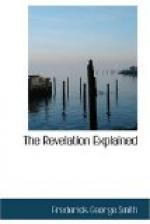To many this may seem a hard saying; but I request that the matter be given the most careful attention in the light of prophecy and divine truth. It is true that the Sixteenth Century Reformation at first brought the witnesses out of the wilderness of seclusion where they had remained during the long night of Romanism and exhibited them to the public view; but when thus placed upon exhibition, they were soon robbed entirely of their position as the Vicars, or Governors, of God’s church. Since creed and sect-making first began, the Word and Spirit have not possesed governing power and authority in Protestantism; but men have usurped that place and prescribed authoritative rules of faith and practise for the people. The principles of Higher Criticism have so far pervaded the realm of sectarian theology that a vast number of the clergy no longer regard the Bible as the inspired word of God to man, but simply as a remarkable piece of religious literature recording the natural development of the religious consciousness among a peculiarly sensitive race of people. Protestantism certainly has placed the Bible on the dissecting table and dismembered it in a manner wholly unknown before. While Protestants will not for a moment allow the blessed Book to be hidden out of sight—put “into graves”—still they will not grant it that place it should occupy as the sole discipline of faith, so it is a dead letter to them. That all-glorious doctrine of Bible unity, which fills the whole New Testament, strikes a deathblow to all the carnal divisions and institutions of sectarianism; and so with one accord they unite in fighting it. “Oh, the good old blessed Bible! we could not do without it,” say they; yet, as everybody knows, they are governed by the discipline and laws that they or their representatives have formulated. Thus, the Word and Spirit of God are brought under the public gaze, only to be treated with such indignity in God’s sight, and killed; while infidels look on, and tauntingly remark, “Either the religion of to-day is no Christianity, or the Word of God is a lie.”
In the beginning of this dispensation the church of God not only consisted of all those who were spiritual, but constituted a visible, organic body as well, made up of numerous local congregations that were separate in the management of their internal affairs, yet interrelated with each other, and were directed by humble pastors, who were, in reference to each other, equal. The Word of God was their only discipline, and the Spirit of God, their great Teacher and Guide. Thus, the two witnesses were active in their official position, in the public view, as the Vicars or Governors of the church of God on earth. When, however, men usurped the place of these Vicars by ignoring the Spirit and rejecting the Word and making their own rules of faith, the effect was a national hierarchy—the church of Rome, which for twelve hundred and sixty years stood in the public view. Yet the two witnesses were still alive, though driven into obscurity and “clothed in sackcloth”; for they still acted in their official position in the congregations of the medieval Christians already referred to, who resisted the doctrines of men and clung tenaciously to the simple, primitive form of church government and allowed the Spirit and Word authority supreme.




